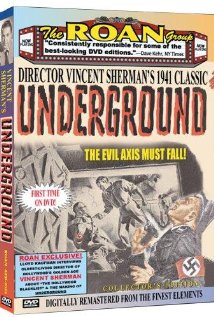
UNDERGROUND
US, 1941, 95 minutes, Black and white.
Jeffrey Lynn, Philip Dorn, Kaaren Verne, Mona Maris, Martin Kosleck.
Directed by Vincent Sherman.
In retrospect, it is surprising to find that this film dates from 1941, early in World War II and produced before the bombing of Pearl Harbor. It is a small melodrama, focusing on the underground resistance in Berlin at the outbreak of the war.
Philip Dorn portrays Eric, a scientist, who is the leader of the underground, with its illegal broadcasts. His younger brother, Kurt, played by Jeffrey Lynn, is a wounded veteran of the war, very loyal to the state. He makes contact with a friend of his brother, a violin player, Sylvia, played by Kaaren Verne. She is also involved in the underground. The screenplay focuses on the preparations for a broadcast, the tracing of the broadcast by the Gestapo, its destruction, the police following leads and releasing a prisoner tortured for several years who may lead them to the rebels.
Kurt becomes more involved with Sylvia, cannot believe that she is part of the underground, and finally, unwittingly, betrays his brother to the authorities. Disillusioned by the torture of prisoners, including his father, he agrees to be the voice of the underground after his brother’s death.
The screenplay is quite straightforward in its condemnation of the Nazis, and speculates about the reason for Rudolf Hess going to the UK – interpreting this as going to the allies. Martin Kosleck plays a credible cruel Nazi.
The film was an early direction piece by Vincent Sherman, who was hindered by the blacklist and his association with actor John Garfield, but who made a comeback directing many television programs.
1. A war-time film? Dramatisation of the Berlin underground? Propaganda against the Nazis?
2. The studio work, re-creation of Berlin, of homes, cafes, Nazi offices, torture rooms? The musical score?
3. Audiences looking back at World War II, German supremacy, resistance? This drama released for years before the end of the war?
4. The presentation of the Franken and family, Eric at home, his skilful work as a scientist, his relationship with his brother, the relationship with Sylvia? The revelation of his work with the underground, Sylvia and the associates, fixing the radio, the broadcast itself, the criticism of German society and of the Nazis?
5. The members of the underground, their work, cover, meetings and codes, secret meeting rooms? The woman working at Gestapo headquarters? Communications, warnings? The member imprisoned, tortured for two years, released, his leading the Gestapo to the cafe, Eric and his friend confronting
him, leaving the gun, he shooting himself?
6. Kurt, wounded, the loss of an arm, the response of his mother and father, at home, the meal? His finding Eric’s card with Sylvia’s name? Seeking her out? The conversations? Following her? Falling in love? Going to the railway station, the mixup with the package, the radio parts? Her being arrested and tortured? Released, Kurt following her, reporting to the Gestapo every day? The courier arriving, Kurt seeing the package, realising the truth? His reports to Heller, the questions, the radio broadcast, his phoning in, not realising it was Eric, the revelation? His trying to save Sylvia?
7. The presentation of the family, ordinary Germans, loyal to the state? The neighbour and the death of his son, anti-Nazi expressions? The arrest of the father, the testimony of the maid about the speech against the State? Her being terrified, confused?
8. Sylvia, playing the violin, her work, the friendship with Kurt, with him, the episode of the railway station and the bag, the discovery of the truth? His saving her?
9. Eric, not suspected, working in the laboratories? The second broadcast? The arrests, his torture? Being brought in, Kurt saying that he betrayed him?
10. The woman working for the Gestapo, the phone calls, information, the showing Kurt his father being tortured, the effect on Kurt, her persuading him to take up Eric’s mission? His final broadcast, the quoting of the Shakespearean text and Eric going to his death knowing that Kurt would continue his work?
11. Heller and his loyalty, cruelty, his assistant and guillotine face upwards? Rivalries? Rumours about Goebbels and Himler and overseas wealth? Vicious torture?
12. Warner Brothers film, small-budget, not well-known, but in retrospect a significant film about World War II?